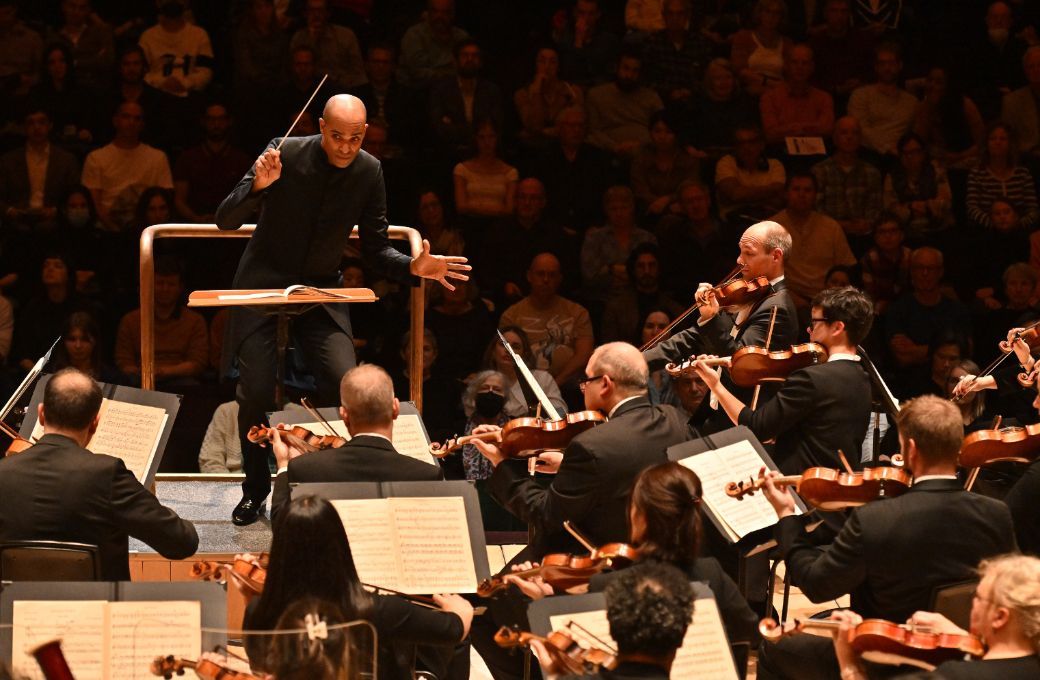Returning to London after a barnstorming Beethoven Nine at the BBC Proms this summer with Chineke!, Kevin John Edusei conducted the London Symphony Orchestra at their Barbican home in a programme of modern and contemporary works.

Samy Moussa's 11-minute Crimson opened the programme. He is the composer of two symphonies and an award-winning violin concerto, and received his first commission at just 19. Crimson was written for the Lucerne Festival in 2015 to celebrate Pierre Boulez. Moussa’s way with the orchestral paintbrush – splashy and extravagant, redolent of Anders Hillborg at times – is a long way from Boulez’ sparks and filigree, though he certainly shares the latter’s sympathy for sudden moments of magic.
It opens with a whoosh of metal percussion and a high woodwind and horn chorale that has remarkable impact. The rest of the piece, whose intermittent episodes swell and contract, draws its energies from this big bang. Some are more characterful than others, with textures unfolded but ideas seldom developed beyond their initial presentation; the most effective is the oozing, sepulchral close, which aches to an exhausted collapse.
LSO leader Roman Simović took centre stage solo duty in Béla Bartók's Violin Concerto no. 2. In the programme, he described his desire to make chamber music in his concerto performances, and throughout there was a strong feeling of collegiality, with Simović bobbing and weaving along to and flashing smiles at his colleagues.
He seemed positioned slightly deeper downstage and thus was more embedded in the orchestral texture, on the one hand achieving a chamber-like effect but on the other giving a less brilliant sound. Lyrical moments had an enigmatic, distant quality, particularly in the periodic returns of the concerto’s beguiling main theme.
There is a toughness to Simović’s playing that stands out most. While some accounts of the concerto are freewheeling, Simović uses a hefty dose of bow pressure to give his sound a hard-bitten quality; the virtuosity of the work was edgy rather than showy, rebarbative even, and its moments of lyrical repose hard-won. It’s a striking reading – neither the Romantic tradition of Isaac Stern nor Patricia Kopatchinskaja’s spectralist experimentation – and resonates with the concerto’s context, capturing Bartók's lack of compromise with his listeners and with rising fascism, the violin as the embattled protagonist.
There’s no question of Simović’s technical brilliance in this fiendish piece, but as the orchestral playing didn’t catch fire, the work felt curiously undercharged. This was especially true of the rambunctious finale, whose free variations get their charge from sudden, mercurial contrasts – see Bartók's contemporaneous trio for clarinet, violin and piano, written for the same fiddle player – in changes of pace and texture. The piece was in underwhelmingly safe hands, when much more daring was in order.
The gloves were off for Petrushka. Edusei’s clarity and transparency paid dividends, with nimble articulation from strings and winds summoning the cold fresh air of the Shrovetide Fair. Dances popped rather than pounded, leather boots on the lightest of feet; soaring moments of melodic repose recalled the composer’s debt to Tchaikovsky. Orchestral detailing was outstanding, particularly in trumpet and flute solos. Stravinsky recalled the smell of cabbage soup – shchi – when he visited St Petersburg in 1911, whose digestive after-effects are heard – though mercifully not smelled – in a pungent bassoon hit after a thrilling climax to the first tableau. There is a moment of inspired banality in the score at the end: Stravinsky says the tambourine should be held close to the floor and then dropped, which was achieved tonight with brilliantly understated nonchalance.


